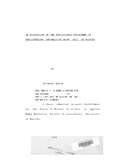| dc.contributor.author | Waithira, Mirie | |
| dc.date.accessioned | 2013-05-23T07:12:38Z | |
| dc.date.available | 2013-05-23T07:12:38Z | |
| dc.date.issued | 1989 | |
| dc.identifier.citation | Degree of Masters of Science in App!ied Human Nutrition. | en |
| dc.identifier.uri | http://erepository.uonbi.ac.ke:8080/xmlui/handle/11295/24623 | |
| dc.description | A thesis submitted in partial fuifiliment
for the Degree of Masters of Science in App!ied
Human Nutrition. Faculty of Agriculture, University
of Nairobi. | en |
| dc.description.abstract | The main objective of this study was to
compare the knowledge. attitudes. ,and practices of
mothers and health workers exposed to the educational
programme of the Breastfeeding Information
Group (BIG) with those who have not been exposed to
the programme. In addition. the knowledge. attitudes
and practices of BIG counselors and members
of the executive committee were also assesed with
respect to their knowledge and practices of breastfeeding
and weaning.
The knowledge. attitude and practice (i(AP ;0
study took place in Maternal and Child Health
Clinics (MCHC) in Nairobi, between January and June
1987. A sample of 150 randomly selected B i
Exposed mothers was compared with a similar sample
of randomly selected NON-BIG Exposed rno t her· s .
Similarly a sample of 24 randomly selected B1GExposed
Health Workers was compared with a s l m I lar
number of NON-BIG Exposed health workers. in addition,
12 BIG volunteers and 6 counsellors were
included in the study. Thus a total of
366 interviews were conducted for the study.
The
higher in
BIG-exposed study sample scored
the knowledge test than the Non-BIG
exposed controls.
-
The initiation of breastfeeding was largely
universal among the entire study sample. The duration
of breastfeeding of the youngest child
however, was longer among mothers not exposed to
the BIG educational programme. than among mothers
exposed to it.
The onset of weaning the youngest child of
both groups of mothers was significantly different
between the two groups. The Non-BIG exposed
mothers introduced supplementary foods earlier than
the BIG-exposed mothers.
Questioned on the main message delivered in
BiG's promotional visual aid (poster) designed to
promote and encourage breastfeeding. the majority
of respondents identified it to be: " to breastfeed"
. | en |
| dc.language.iso | en | en |
| dc.publisher | University of Nairobi | en |
| dc.title | An evaluation of the educational programme of Breastfeeding Information Group (BIG) in Nairobi | en |
| dc.type | Thesis | en |
| dc.description.department | a
Department of Psychiatry, University of Nairobi, ; bDepartment of Mental Health, School of Medicine,
Moi University, Eldoret, Kenya | |
| local.publisher | Faculty of Agriculture | en |

